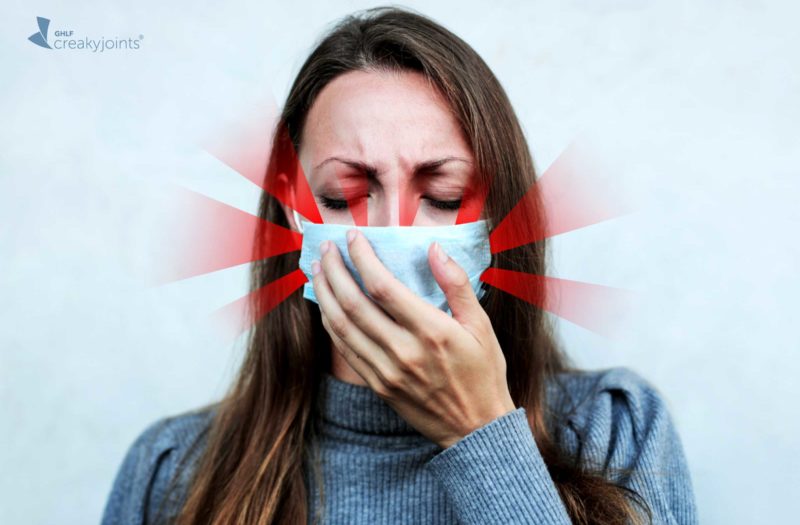Learn more about our FREE COVID-19 Patient Support Program for chronic illness patients and their loved ones.
Depending on someone’s point of view, wearing a mask is an excellent way to protect yourself and others from COVID-19, not necessary, or downright bad for your health.
But what does the science say? Both American and European researchers recently investigated this issue and the evidence firmly supports the benefits of mask-wearing — even if you have a serious breathing disorder like COPD (chronic obstructive pulmonary disorder). (CreakyJoints and the Global Healthy Living Foundation are staunch supporters of face masks and covering to help prevent the spread of COVID-19.)
Of course, masks aren’t a cure-all, and they aren’t a complete substitute for other COVID-19 contagion measures, like social distancing, avoiding large events and crowds, and practicing good hand hygiene. But plenty of research shows that wearing a cloth or surgical mask or face covering helps reduce transmission of COVID-19, and importantly, that there is no proof that face masks trap dangerous levels of carbon dioxide (CO2) or otherwise interfere with breathing.
In the U.S., a group of Florida-based physicians studied the impact that wearing a surgical mask had on carbon dioxide and oxygen levels in the blood. They had 15 healthy doctors and 15 veterans with severe COPD wear face masks for 30 minutes and also participate in a six-minute “walk test” while wearing a mask.
According to the results, which were published in the journal Annals of the American Thoracic Society, “gas exchange is not significantly affected by the use of surgical mask, even in subjects with severe lung impairment.”
The authors also noted that while some people might find masks to be uncomfortable, “it is important to inform the public that the discomfort associated with mask use should not lead to unsubstantiated safety concerns” and that “universal mask use [that does not exempt people with respiratory conditions from wearing a mask in public] needs to be vigorously enforced in community settings.”
A European group of pulmonologists, writing in the European Respiratory Journal, reached a similar conclusion. This team did not conduct their own study but reviewed the available evidence to date and stated that medical exemptions from wearing a face mask are a bad idea.
The explained that while some people, especially those with respiratory conditions, might feel uncomfortable wearing a mask, that’s generally due to a sensation of anxiety or claustrophobia and that wearing a mask made of breathable material is not dangerous for this group.
But giving them a pass on wearing masks might be: “Relieving respiratory patients from the obligation to wear masks could be highly deleterious for them, since by definition those patients with respiratory conditions who cannot tolerate face masks are at higher risk of severe COVID-19,” they wrote.
Get Free Coronavirus Support for Chronic Illness Patients
Join the Global Healthy Living Foundation’s free COVID-19 Support Program for chronic illness patients and their families. We will be providing updated information, community support, and other resources tailored specifically to your health and safety. Join now.
Boyles S. Mask Mandate Exceptions Put Pulmonary Patients at Risk. MedPage Today. October 2, 2020. https://www.medpagetoday.com/infectiousdisease/covid19/88922.
Samannan R, et al. Effect of Face Masks on Gas Exchange in Healthy Persons and Patients with COPD. Annals of the American Thoracic Society. October 2, 2020. doi: https://doi.org/10.1513/AnnalsATS.202007-812RL.
Soriano JB, et al. Face masks, respiratory patients and COVID-19. European Respiratory Journal. October 2020. Doi: https://doi.org/10.1183/13993003.03325-2020.






